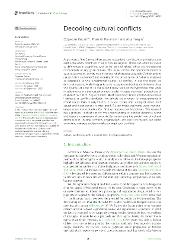| dc.contributor.author | Kocak, Ozgecan | |
| dc.contributor.author | Puranam, Phanish | |
| dc.contributor.author | Yegin, Afsar | |
| dc.date.accessioned | 2023-10-19T15:11:46Z | |
| dc.date.available | 2023-10-19T15:11:46Z | |
| dc.date.issued | 2023 | |
| dc.identifier.issn | 1664-1078 | |
| dc.identifier.uri | https://doi.org/10.3389/fpsyg.2023.1166023 | |
| dc.identifier.uri | https://hdl.handle.net/20.500.12469/5214 | |
| dc.description.abstract | As pioneers of the Carnegie Perspective recognized, conflicts in organizations can exist even when incentives of all parties are aligned. These can often be traced to differences in cognitions such as beliefs and values, which are foundational components of any given culture. This paper refines the operationalization of cultural clashes by identifying differences in beliefs about causality (which actions cause which outcomes) and morality (in the broad sense of what is evaluated as desirable) as two fundamental sources of conflict. In our first study, we demonstrate empirically that participants recognize and distinguish between these two sources of conflict. In our second study, we test the hypotheses that while misalignments in either causal or moral codes increase observers' perceptions of relationship conflict, negative affect, likelihood of avoidance, and lower perceived likelihood of conflict resolution, the effects are stronger for misalignments in moral codes than misalignments in causal codes and strongest when both causal and moral codes are misaligned. We test these arguments using vignette-based experimental studies. Our findings support our hypotheses. This research has significant implications for the understanding of conflict dynamics within and beyond organizational contexts. By recognizing the pivotal role of cultural differences in shaping conflicts, organizations and decision-makers can better anticipate, manage, and potentially preempt such conflicts. | en_US |
| dc.language.iso | eng | en_US |
| dc.publisher | Frontiers Media Sa | en_US |
| dc.relation.ispartof | Frontiers in Psychology | en_US |
| dc.rights | info:eu-repo/semantics/openAccess | en_US |
| dc.subject | Intragroup Conflict | En_Us |
| dc.subject | Representational Gaps | En_Us |
| dc.subject | Strategy | En_Us |
| dc.subject | Organizations | En_Us |
| dc.subject | Cognition | En_Us |
| dc.subject | Transformation | En_Us |
| dc.subject | Communities | En_Us |
| dc.subject | Information | En_Us |
| dc.subject | Perceptions | En_Us |
| dc.subject | Performance | En_Us |
| dc.subject | culture | en_US |
| dc.subject | conflict | en_US |
| dc.subject | vignettes | en_US |
| dc.subject | experiments | en_US |
| dc.subject | Carnegie perspective | en_US |
| dc.title | Decoding cultural conflicts | en_US |
| dc.type | article | en_US |
| dc.identifier.volume | 14 | en_US |
| dc.department | N/A | en_US |
| dc.identifier.wos | WOS:001074700000001 | en_US |
| dc.identifier.doi | 10.3389/fpsyg.2023.1166023 | en_US |
| dc.identifier.scopus | 2-s2.0-85173054120 | en_US |
| dc.institutionauthor | N/A | |
| dc.relation.publicationcategory | Makale - Uluslararası Hakemli Dergi - Kurum Öğretim Elemanı | en_US |
| dc.identifier.pmid | 37780139 | en_US |
| dc.khas | 20231019-WoS | en_US |
















